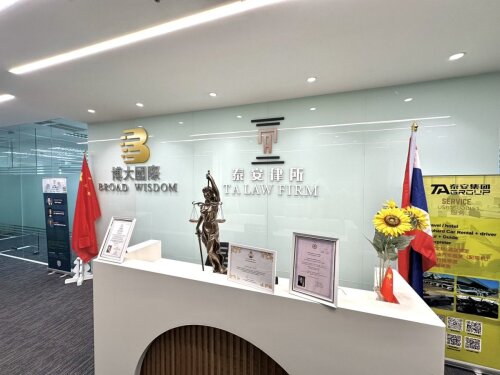Best General Litigation Lawyers in Yan Nawa
Share your needs with us, get contacted by law firms.
Free. Takes 2 min.
List of the best lawyers in Yan Nawa, Thailand
Thailand General Litigation Legal Articles
Browse our 1 legal article about General Litigation in Thailand written by expert lawyers.
- Dispute Resolution for B2B Transactions in Thailand: A Detailed Overview
- Dispute Resolution for B2B Transactions in Thailand: A Detailed OverviewDispute resolution is a critical component of business-to-business interactions. Thailand's legal structure allows for a variety of conflict resolution options, including litigation, arbitration, and mediation. Understanding these procedures is critical for attorneys and law firms advising businesses on commercial activity. This... Read more →
About Litigation Law in Yan Nawa, Thailand
Litigation refers to the process of resolving disputes through the court system. In Yan Nawa, a district in Bangkok, Thailand, litigation encompasses civil, criminal, and administrative cases. The legal process generally involves presenting cases before judges in accordance with Thai law. Whether it is a personal dispute, a business conflict, or a criminal matter, litigation in Yan Nawa is governed by the Thai judicial system, with local courts handling a variety of claims. Understanding the steps, requirements, and procedures is crucial for anyone seeking justice or defending their rights in this region.
Why You May Need a Lawyer
Litigation can be complex and intimidating, especially if you are unfamiliar with the law or the workings of the Thai legal system. Many individuals and businesses in Yan Nawa require legal assistance due to situations such as:
- Breach of contract disputes
- Property or land disagreements
- Employment conflicts
- Debt recovery matters
- Business partner disagreements
- Personal injury claims
- Criminal charges or accusations
- Family and inheritance law issues
A qualified lawyer can offer crucial support by guiding you through the litigation process, representing you in court, helping you gather necessary evidence, and ensuring you comply with all legal requirements in Yan Nawa.
Local Laws Overview
Thai litigation operates primarily under the Civil and Commercial Code, the Criminal Code, and various procedural laws. Key aspects relevant to litigation in Yan Nawa include:
- Jurisdiction: The courts in Yan Nawa generally handle cases within the district or as allocated by the Bangkok Metropolitan Court structure.
- Language: Proceedings are conducted in Thai, and foreign documents must be officially translated.
- Representation: Parties may represent themselves, but legal counsel is highly recommended due to the complexity of legal procedures.
- Evidence: Courts require well-documented evidence; strict rules apply to admissibility and presentation.
- Time Limits: There are specific statutes of limitation for different types of claims; missing a deadline can result in your case being dismissed.
- Appeals: Most decisions can be appealed, but short deadlines apply, and appellate procedure is formal.
Being aware of these factors helps individuals and businesses protect their rights and navigate the litigation process efficiently in Yan Nawa.
Frequently Asked Questions
What is the first step if I want to start a lawsuit in Yan Nawa?
You must file a complaint or petition with the appropriate court, usually accompanied by supporting documents and payment of court fees. Consulting a lawyer before initiating the process is advisable.
Do I need a lawyer for litigation in Yan Nawa?
While you are allowed to represent yourself, engaging a Thai lawyer provides significant advantages, especially given the language and procedural requirements of the courts.
How long does a typical litigation process take?
The timeline varies widely depending on case complexity. Simple cases might conclude within several months, while complicated matters could take years.
What types of cases can be handled by local courts in Yan Nawa?
Local courts handle civil, criminal, family, and some administrative cases, depending on the subject and value of the case.
Is mediation or settlement possible before going to court?
Yes, the Thai legal system encourages parties to settle their disputes out of court through mediation or conciliation. This can save time and expenses for all parties involved.
What happens if I lose my case?
If you lose, you may have to comply with the court’s judgment, which could include paying damages or taking corrective actions. You may also be responsible for some legal costs.
Can I appeal a court decision?
Yes, most court decisions can be appealed to a higher court within a specific period, usually 30 days from the date the judgment is rendered.
What documents do I need for litigation?
You generally need identification, evidence relevant to your case (such as contracts, correspondence, or receipts), and translations if documents are not in Thai.
Are court proceedings open to the public?
Most hearings are public unless the law states otherwise, such as in sensitive family or juvenile cases.
How can a foreigner participate in litigation in Yan Nawa?
Foreigners can sue or be sued in Thai courts, but all documents must be in Thai, and it is highly recommended to engage a local lawyer who understands both the language and legal system.
Additional Resources
Here are some resources and organizations that can assist with litigation matters in Yan Nawa:
- The Bangkok South Civil Court
- The Legal Aid Office under the Lawyers Council of Thailand
- Yan Nawa District Office for legal certificates and translations
- Royal Thai Police, for criminal complaints and procedures
- Thai Bar Association, for lawyer referrals
These organizations provide information, referrals, and direct legal support for people involved in litigation across Yan Nawa and the broader Bangkok area.
Next Steps
If you find yourself needing legal assistance for a litigation matter in Yan Nawa, consider the following actions:
- Document all relevant information and evidence connected to your dispute
- Consult with a licensed Thai lawyer specializing in litigation to evaluate your case
- Contact the appropriate local court or legal aid organization if you require further information on procedures
- Understand the costs and timelines associated with your case
- Follow your lawyer’s advice regarding steps to protect your rights and interests
Taking informed and timely action can make a significant difference in the outcome of your litigation. If you are unsure about any aspect, seek professional legal advice at the earliest opportunity.
Lawzana helps you find the best lawyers and law firms in Yan Nawa through a curated and pre-screened list of qualified legal professionals. Our platform offers rankings and detailed profiles of attorneys and law firms, allowing you to compare based on practice areas, including General Litigation, experience, and client feedback.
Each profile includes a description of the firm's areas of practice, client reviews, team members and partners, year of establishment, spoken languages, office locations, contact information, social media presence, and any published articles or resources. Most firms on our platform speak English and are experienced in both local and international legal matters.
Get a quote from top-rated law firms in Yan Nawa, Thailand — quickly, securely, and without unnecessary hassle.
Disclaimer:
The information provided on this page is for general informational purposes only and does not constitute legal advice. While we strive to ensure the accuracy and relevance of the content, legal information may change over time, and interpretations of the law can vary. You should always consult with a qualified legal professional for advice specific to your situation.
We disclaim all liability for actions taken or not taken based on the content of this page. If you believe any information is incorrect or outdated, please contact us, and we will review and update it where appropriate.









